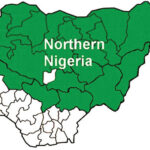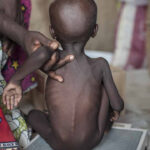Introduction
In the northern regions of Nigeria, a wave of unrest has swept across communities, leaving in its wake an unprecedented surge in incidents of food looting. This disturbing trend has not only captured the attention of local authorities but has also ignited a broader discourse on the underlying socioeconomic factors driving such actions.
As I delve into this complex issue, it becomes imperative to unravel the intricate web of circumstances that has led the Nigerian masses to resort to looting essential food supplies from warehouses and trunks.
At its core, this phenomenon underscores the harsh reality of economic hardships gripping the nation, particularly the northern provinces. High unemployment rates coupled with soaring inflation have created a climate of financial instability for a significant portion of the population. Families who were already grappling with the challenges of making ends meet now find themselves navigating through an even more precarious landscape, where access to basic necessities becomes a daily struggle.
The emergence of the COVID-19 pandemic further exacerbated existing economic woes, amplifying the vulnerabilities of those residing in the northern part of Nigeria. Lockdown measures and the subsequent economic downturn have left countless individuals with diminished income and increased difficulty in securing essential resources. The ripple effects of these hardships have directly contributed to the desperation that fuels the recent surge in food-related looting incidents.
- Moments ‘hungry’ Nigerians damned the consequence to ease hardship
- Hardship: Abuja warehouse looting a reflection of Tinubu’s policies – SAN
A fundamental lack of trust in government institutions has permeated the societal fabric, creating an environment where citizens feel compelled to take matters into their own hands. This scepticism is rooted in a historical context of perceived corruption and ineffective governance, eroding the confidence of the populace in official channels for resource distribution.
This article (my opinion) aims to dissect and analyse the multifaceted aspects of this crisis, examining the economic challenges, pandemic fallout, trust deficit in government, unequal resource distribution, and the role of communication gaps in shaping public perception. By comprehensively understanding these factors, I can begin to fathom the depths of the issue and, more importantly, explore sustainable solutions that address the root causes and provide a pathway towards a more secure and stable future for all Nigerians.
Economic hardships
In the expansive landscape of northern Nigeria, economic hardships have emerged as a pervasive force, casting a shadow over the daily lives of its inhabitants. At the heart of this section lies a poignant exploration of the multifaceted challenges that have plunged a significant portion of the population into financial turmoil.
A critical aspect of the economic hardships faced by the Nigerian masses in the north is the soaring unemployment rates. The scarcity of job opportunities, coupled with the growing population, has created a demographic bulge of young individuals entering the workforce with limited prospects. The resulting strain on families to sustain themselves financially has become a stark reality, with the lack of gainful employment contributing to the widening obvious cycle of poverty.
Impact of the COVID-19 pandemic
The seismic shockwaves of the COVID-19 pandemic have reverberated globally, but perhaps nowhere more acutely than in the northern regions of Nigeria. One of the primary consequences of the pandemic in the northern part of Nigeria has been the disruption of livelihoods. Lockdown measures, implemented to curb the spread of the virus, led to the closure of businesses, stalls, and markets, leaving many without a source of income.
Trust deficit in government
In the intricate tapestry of Nigerian society, a palpable sense of mistrust has taken root, particularly in relation to government institutions. The history of Nigeria is marked by instances of perceived corruption, ineffective governance, and a widening disconnect between the government and the governed. This historical backdrop plays a significant role in shaping the scepticism that prevails today.
Unequal distribution of resources
In the intricate landscape of northern Nigeria, the unequal distribution of resources stands as a stark manifestation of societal disparities. The revelation of significant reserves of food and essential supplies stored in warehouses has become a focal point in the narrative surrounding the unequal distribution of resources. Allegedly reserved for distribution during crises, these stockpiles have sparked public outrage, particularly in the northern regions, where reports of food shortages are prevalent. The stark contrast between abundant reserves and communities in dire need underscores the gravity of the issue.
Communication gaps and public perception
Within the intricate web of challenges contributing to the surge in food looting incidents in northern Nigeria, the role of communication gaps and their impact on public perception cannot be overstated. One of the primary contributors to communication gaps is the limited access to accurate and timely information, especially in rural and underserved areas of northern Nigeria.
Conclusion
In navigating the labyrinth of socioeconomic challenges leading to the surge in food looting incidents in northern Nigeria, a comprehensive understanding of the interwoven factors becomes paramount. The confluence of economic hardships, the impact of the COVID-19 pandemic, a trust deficit in government, unequal resource distribution, and communication gaps forms a complex tapestry that demands nuanced solutions.
Abbas Haruna Idris is a Wikipedia editor and wrote from Kwarbai, Zaria city

 Join Daily Trust WhatsApp Community For Quick Access To News and Happenings Around You.
Join Daily Trust WhatsApp Community For Quick Access To News and Happenings Around You.


